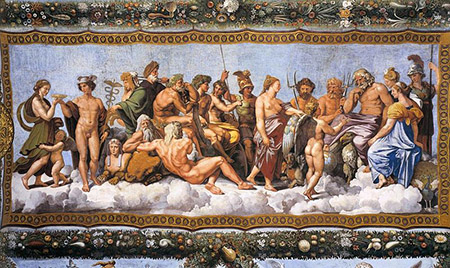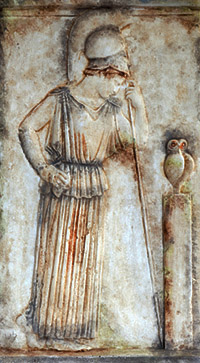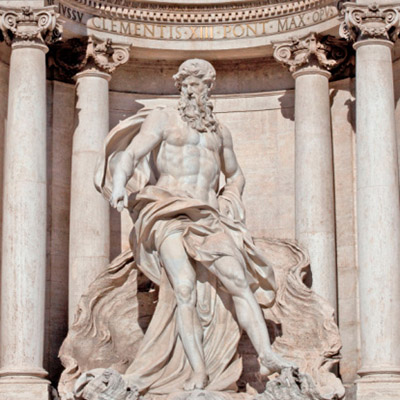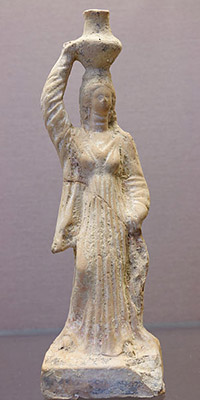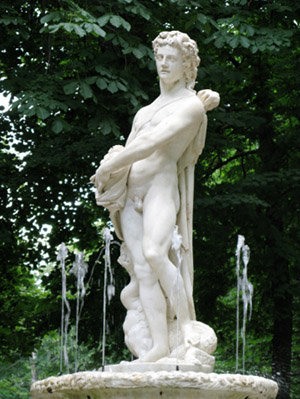Humans in the earliest civilizations tended to worship many gods. In other words, they practiced polytheism.
| Word Roots: | ||
| poly = many | theos = god(s) | polytheistic = many gods |
The Greeks, for example, believed that a large family of gods and goddesses occupied Mount Olympus, a place high in the heavens that humans could not reach. Each of these deities was the god or goddess of one or more aspects of society, with the father and king of the gods, Zeus, as their leader. The Greeks focused many aspects of daily life on the worship of their gods, and they believed that most events on Earth occurred due to the whim or motives of someone on Mt. Olympus. Learn more about the Greek gods in this slideshow.
|
The Greek gods lived on Mount Olympus. They were ruled by Zeus, king of the gods (the seated god on the right). There were twelve main gods, including the gods of love, war, wisdom, the sea, fire, and wine, and then a host of other, lesser gods who controlled smaller aspects of nature or human life.
Greek cities often considered a god or goddess to be their patron. Athens was dedicated to Athena, the great goddess of war and wisdom. The city took its name from the goddess. Its successes were credited to her protection and guidance, and a great temple on the Acropolis was dedicated to her.
In a polytheistic religion, the many gods represent many human characteristics: Gods are greedy, jealous, and deceptive. They fall in love with people and they hate people. They have favorites. For example, Athena was the patroness of the Greek hero Odysseus, and helped him when he aroused the anger of Poseidon, god of the sea, shown above. According to legend, Odysseus blinded Poseidon’s son, Polyphemus the Cyclops, and in his rage Poseidon decreed that Odysseus would never make it home from the Trojan War. Homer’s Odyssey is the story of Odysseus being endangered by Poseidon and saved by Athena over and over again.
This is a small statue of someone worshiping Demeter, the ancient Greek goddess of agriculture and fertility. She carries an urn filled with water to offer at a shrine dedicated to Demeter. A statue like this might have been placed in a household shrine to the goddess. Greek cities, towns, and villages were filled with temples and shrines to the gods, and each household worshiped a few gods or goddesses in particular, placing offerings of food, wine, oil, and other goods at the shrines, along with prayers.
This is Apollo, the god of medicine, who could also tell the future. Greeks visited a great temple to Apollo in the Greek city of Delphi when they needed to know what they should do in a difficult situation. Should they marry one person or another? Which choice would result in a happy future? Only Apollo could look into the future and know. So Greeks went to Delphi, paid a fee, drank drugged wine, and waited in a small, dark room for an apparition, or sign, from the god. Often the message they received was confusing, and they asked a priest to help them decipher it. How did they receive a message? Archeologists have found secret doorways and passages between the rooms in the temple that priests likely used to make sounds, pipe in smoke, or create other messages from Apollo. |
Question
How did polytheism in classical Greece affect the way cities were built and societies were organized?
